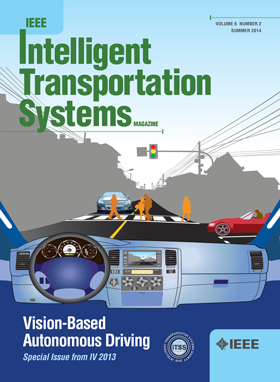Curricular Subgoals for Inverse Reinforcement Learning
IF 7.9
1区 工程技术
Q1 ENGINEERING, CIVIL
IEEE Transactions on Intelligent Transportation Systems
Pub Date : 2025-01-30
DOI:10.1109/TITS.2025.3532519
引用次数: 0
Abstract
Inverse Reinforcement Learning (IRL) aims to reconstruct the reward function from expert demonstrations to facilitate policy learning, and has demonstrated its remarkable success in imitation learning. To promote expert-like behavior, existing IRL methods mainly focus on learning global reward functions to minimize the trajectory difference between the imitator and the expert. However, these global designs are still limited by the redundant noise and error propagation problems, leading to the unsuitable reward assignment and thus downgrading the agent capability in complex multi-stage tasks. In this paper, we propose a novel Curricular Subgoal-based Inverse Reinforcement Learning (CSIRL) framework, that explicitly disentangles one task with several local subgoals to guide agent imitation. Specifically, CSIRL firstly introduces decision uncertainty of the trained agent over expert trajectories to dynamically select specific states as subgoals, which directly determines the exploration boundary of different task stages. To further acquire local reward functions for each stage, we customize a meta-imitation objective based on these curricular subgoals to train an intrinsic reward generator. Experiments on the D4RL and autonomous driving benchmarks demonstrate that the proposed methods yields results superior to the state-of-the-art counterparts, as well as better interpretability. Our code is publicly available at求助全文
约1分钟内获得全文
求助全文
来源期刊

IEEE Transactions on Intelligent Transportation Systems
工程技术-工程:电子与电气
CiteScore
14.80
自引率
12.90%
发文量
1872
审稿时长
7.5 months
期刊介绍:
The theoretical, experimental and operational aspects of electrical and electronics engineering and information technologies as applied to Intelligent Transportation Systems (ITS). Intelligent Transportation Systems are defined as those systems utilizing synergistic technologies and systems engineering concepts to develop and improve transportation systems of all kinds. The scope of this interdisciplinary activity includes the promotion, consolidation and coordination of ITS technical activities among IEEE entities, and providing a focus for cooperative activities, both internally and externally.
 求助内容:
求助内容: 应助结果提醒方式:
应助结果提醒方式:


